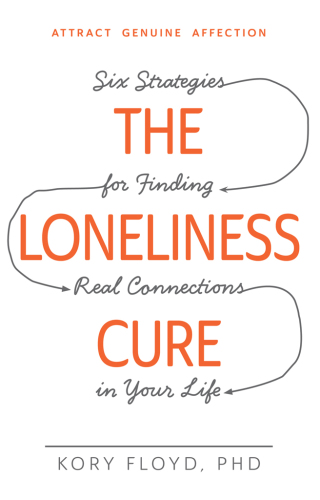
The Loneliness Cure
Six Strategies for Finding Real Connections in Your Life
کتاب های مرتبط
- اطلاعات
- نقد و بررسی
- دیدگاه کاربران
نقد و بررسی

May 4, 2015
Arizona State Universityprofessor Floyd (Interpersonal Communication) turns his academic research on affection into a self-help book for the lay reader. According to the author, "three out of four American adults agree that Americans are affection deprived," and furthermore, "we touch our cellphones more than we touch each other." "Affection hunger" is the state of receiving less affection than one wants or needs. The need varies, depending on culture, nature, and nurture. Who tops the affection-deprived list? Single, neurotic, Asian-American males earning good livings in Germany or on one of the U.S. coasts. The author looks at affection as more than simple physical contact, dividing it, broadly speaking, into two categories: instrumental (activities or behaviors that show affection) and expressive (physical or verbal). Kory divides the book into three parts that show how and why humans need affection and often lack it, help readers evaluate their level of affection hunger, and give six strategies for satisfying that hunger and banishing loneliness. His colloquial style combines anecdotes, questions for the reader to reflect on, and explanations of the research he conducted. This book is perhaps reductive in its approach to knotty emotional problems, but it is nonetheless thought-provoking. Agent: Linda Konner, Linda Konner Literary.

April 1, 2016
In this self-help guide, a communication expert details the effects of "affection hunger" and strategies to make more meaningful connections. Floyd (Human Communication/Arizona State Univ.) notes that more and more people feel like they're not getting as much affection as they need--they hunger, he says, for more quality human interaction. He asserts that the rise of social media, while offering some communal benefits, is largely making things worse, creating a "pseudo-intimacy." He then details how affection deprivation causes an array of mental and physical problems, including weakened immune systems, higher cortisol/stress levels, and self-destructive behaviors. The book offers examples and anecdotes, including some from Floyd's own "affection lab" studies. He recommends that everyone should determine their own affection needs and tackle their loneliness issues. He offers six strategies for this purpose: assess one's fears in accepting affection; invite and model, rather than demand, the kind of relationships one seeks; recognize that others may express affection differently (many men, for example, express it by doing tasks); nurture a variety of affectionate relationships; be alert to "toxic affection" practitioners; and lastly, be optimistic yet realistic, as relationships will have ups and downs. Debut author Floyd is certainly not the first to spotlight the reality and consequences of increasing disconnection in our society, but he offers clear, simple, and very welcome direction on what to do about it on a grass-roots, personal level. He offers his advice in warm, relatable fashion, wryly acknowledging his own affection tendencies and needs: "When my colleague put her arms around me in the hallway, it didn't change anything about what had gone wrong in my day. However, it changed everything about the way I felt." He also sprinkles helpful "Try This" suggestions and "Stop and Reflect" self-evaluation questions throughout his text. A practical, inspiring primer to assess and address one's particular emotional requirements.
COPYRIGHT(2016) Kirkus Reviews, ALL RIGHTS RESERVED.

May 1, 2015
Ironically, now that technology allows communication all over the globe, more people are finding themselves increasingly disconnected from others and unhappy in the real world. So says Floyd (family & interpersonal communication, Arizona State Univ.), who goes on to demonstrate in this book why affection, both physical and emotional, is vital to mental and physical well-being. After helping readers assess their own needs for affection and describing how not to get it, Floyd provides six strategies for giving and getting more, including the recognition of diverse ways of showing caring, the openness to a variety of people, and the awareness of toxic support. VERDICT Floyd's eye-opening and realistic approach for connecting with others will find wide appeal.
Copyright 2015 Library Journal, LLC Used with permission.

























دیدگاه کاربران